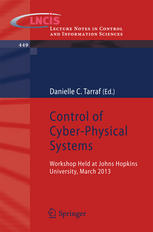

Most ebook files are in PDF format, so you can easily read them using various software such as Foxit Reader or directly on the Google Chrome browser.
Some ebook files are released by publishers in other formats such as .awz, .mobi, .epub, .fb2, etc. You may need to install specific software to read these formats on mobile/PC, such as Calibre.
Please read the tutorial at this link: https://ebookbell.com/faq
We offer FREE conversion to the popular formats you request; however, this may take some time. Therefore, right after payment, please email us, and we will try to provide the service as quickly as possible.
For some exceptional file formats or broken links (if any), please refrain from opening any disputes. Instead, email us first, and we will try to assist within a maximum of 6 hours.
EbookBell Team

4.8
104 reviewsCyber-physical systems (CPS) involve deeply integrated, tightly coupled computational and physical components. These systems, spanning multiple scientific and technological domains, are highly complex and pose several fundamental challenges. They are also critically important to society’s advancement and security. The design and deployment of the adaptable, reliable CPS of tomorrow requires the development of a basic science foundation, synergistically drawing on various branches of engineering, mathematics, computer science, and domain specific knowledge.
This book brings together 19 invited papers presented at the Workshop on Control of Cyber-Physical Systems, hosted by the Department of Electrical & Computer Engineering at The Johns Hopkins University in March 2013. It highlights the central role of control theory and systems thinking in developing the theory of CPS, in addressing the challenges of cyber-trust and cyber-security, and in advancing emerging cyber-physical applications ranging from smart grids to smart buildings, cars and robotic systems.